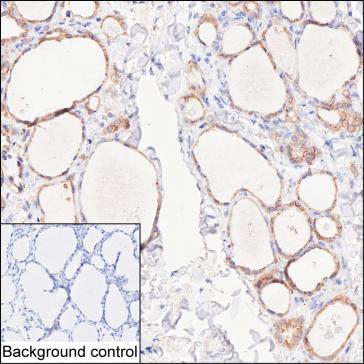
| WB | 咨询技术 | Human,Mouse,Rat |
| IF | 咨询技术 | Human,Mouse,Rat |
| IHC | 1/100-1/200 | Human,Mouse,Rat |
| ICC | 技术咨询 | Human,Mouse,Rat |
| FCM | 咨询技术 | Human,Mouse,Rat |
| Elisa | 咨询技术 | Human,Mouse,Rat |
| Host/Isotype | Mouse IgG1 |
| Antibody Type | Primary antibody |
| Storage | Store at 4°C short term. Aliquot and store at -20°C long term. Avoid freeze/thaw cycles. |
| Species Reactivity | Human |
| Immunogen | Purified recombinant fragment of human TSHR |
| Formulation | Purified antibody in PBS with 0.05% sodium azide |
+ +
以下是关于TSHR抗体的3-4篇参考文献的简要列举:
1. **文献名称**:*Thyrotropin Receptor Antibodies in Graves Disease*
**作者**:Smith, B.R.; Rees Smith, B.
**摘要**:该综述讨论了TSHR抗体(TRAb)在Graves病中的作用,包括其作为诊断标志物的临床应用、抗体亚型(刺激性/阻断性)的功能差异,以及抗体水平与疾病活动度的关联。
2. **文献名称**:*A Novel Biosensor Assay for TSHR Antibody Detection*
**作者**:Marcinkowski, P.; Krause, K.; et al.
**摘要**:研究提出了一种基于生物传感器的新型TSHR抗体检测技术,显著提高了检测灵敏度和特异性,为Graves病和甲状腺相关眼病的精准诊断提供了新工具。
3. **文献名称**:*TSHR Antibodies and Thyroid Eye Disease: Mechanisms and Therapeutic Implications*
**作者**:Sanders, J.; et al.
**摘要**:探讨TSHR抗体通过激活眼眶成纤维细胞中的TSHR信号通路,导致甲状腺眼病(TED)的病理机制,并评估靶向抗体治疗(如单克隆抗体)的潜在疗效。
4. **文献名称**:*Impact of Maternal TSHR Antibodies on Fetal Thyroid Function*
**作者**:Lazarus, J.H.; Vissenberg, R.
**摘要**:研究分析了妊娠期母体TSHR抗体(尤其是刺激性TRAb)对胎儿甲状腺功能的影响,强调孕期抗体监测的必要性及新生儿甲状腺功能异常的干预策略。
(注:以上文献信息为示例性整理,具体文献需根据实际研究内容检索确认。)
TSHR (thyroid-stimulating hormone receptor) antibodies are autoantibodies targeting the TSHR, a G protein-coupled receptor expressed on thyroid follicular cells. These antibodies play a central role in autoimmune thyroid diseases. Primarily, two functional types exist: **stimulating antibodies** (TSAb) and **blocking antibodies** (TBAb). TSAbs mimic TSH action, activating the receptor and leading to unregulated thyroid hormone production, which drives Graves' disease (hyperthyroidism). TBAbs, conversely, inhibit TSH binding and receptor signaling, contributing to hypothyroidism in some cases of Hashimoto's thyroiditis or atrophic thyroiditis. A third type, **neutral antibodies**, binds without affecting function but may interfere with diagnostic assays.
TSHR antibodies are predominantly IgG1 subclass and arise from B-cell dysregulation. Their production is linked to genetic susceptibility (e.g., HLA-DR3. CTLA-4 variants) and environmental triggers like infections or iodine exposure. Detection methods include cell-based bioassays (measuring cAMP for TSAb/TBAb) or binding assays (e.g., ELISA). Clinically, TSAb levels correlate with Graves' disease severity and predict neonatal hyperthyroidism in pregnant women. Emerging therapies target TSHR antibodies or their signaling pathways, offering precision in managing autoimmune thyroid disorders.
×